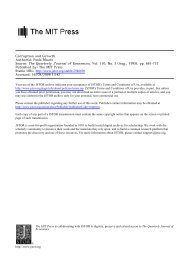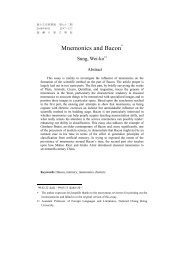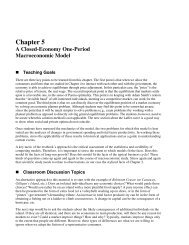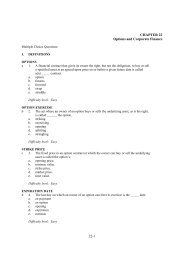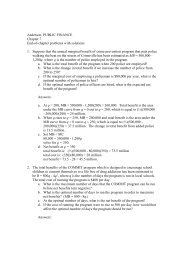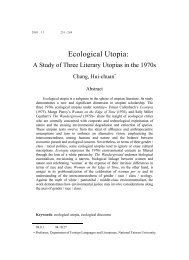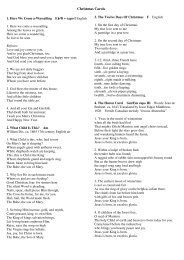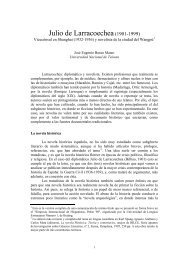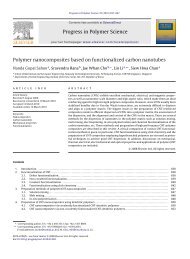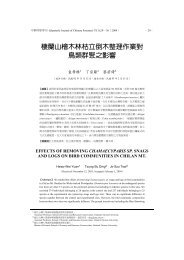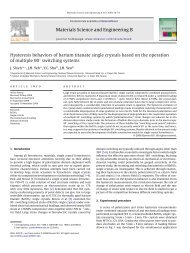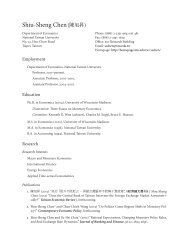Interest Groups & Political Parties
Interest Groups & Political Parties
Interest Groups & Political Parties
You also want an ePaper? Increase the reach of your titles
YUMPU automatically turns print PDFs into web optimized ePapers that Google loves.
<strong>Interest</strong> <strong>Groups</strong> & <strong>Political</strong> <strong>Parties</strong><br />
Instructor: D.M. Wang<br />
•An interest group can become a pressure group.<br />
–Example: A labor union may use union dues<br />
paid by members to help in its lobbying for a<br />
law to reduce competition.<br />
•A pressure group supplies, not necessary, interest<br />
group services.<br />
–Example: A doctor’s asociation that provides<br />
information about new medicines.<br />
Defining interest group<br />
•An organization of people that shared policy<br />
goals entering the policy process at several points<br />
to try to achieve those goals.<br />
•Some defines interest group as a collective of<br />
members with common interests, while pressure<br />
group as a collective whose members want to<br />
influence policies and laws.<br />
Functions of interest group<br />
•Raise awareness and stimulate interest in public<br />
affairs by educating their members and the public.<br />
•Represent membership, serving as a link between<br />
members and government.<br />
•Provide information to government, especially<br />
data adding testimony is useful in making public<br />
policy.<br />
•Provide channels for political participation that<br />
enable citizens to work together to achieve a<br />
common goal.<br />
Iron Triangle (Sub-government) Types of interest groups<br />
•Almond & Powell (1978) categorized four types of<br />
interest groups:<br />
–Anomic/anomalistic groups:<br />
a group of people spontaneously gathering<br />
together. They pursue their interests and wills for<br />
an accidental event. The action may resorts to a<br />
riot.<br />
2012/11/28<br />
1
–Non-associational groups:<br />
informal organization like anomic interest groups.<br />
But the “members” of the same group share some<br />
common characters, such as race, language,<br />
religion, culture, occupation, etc. They may take<br />
joint action when necessary.<br />
–Associational groups:<br />
the most narrow definition of interest groups.<br />
People are organized together specifically for<br />
pursuing the common interests of its members.<br />
•Heywood (1997) categorized three types of<br />
interest groups:<br />
–Communal groups:<br />
The members are framed in the social context<br />
because of their identity, such as on their family,<br />
castes, race etc. They are based on the shared<br />
heritage and emotional connection, and not<br />
formally organized.<br />
–Associational groups:<br />
Same with Almond & Powel’s definition. People<br />
are volunteer to participate and take actions, with<br />
common interests, expectations, and attitudes.<br />
Heywood thinks they may also distinguish some<br />
with more for social identity and some with more<br />
implementation purpose.<br />
–Institutional groups:<br />
this type of group does not emerge independently.<br />
A formal, and purposive institute, such as a<br />
bureaucracy, party, church, or corporation,<br />
decides to take extra action to pursue their<br />
common interests.<br />
–Institutional groups:<br />
Similar with Almond & Powel’s definition. They<br />
are actually party of government institution, trying<br />
to make an influence within the system.<br />
Heywood thinks these groups may appear both in<br />
the democracy and authoritarian.<br />
These group may ally with traditional interest<br />
groups, such as “military-industrial complex”in<br />
defense purchase.<br />
•Grassroots<br />
–Grassroots is a movement driven by the politics of<br />
a community.<br />
–The term implies that the creation of the<br />
movement and the group supporting it are natural<br />
and spontaneous.<br />
•http://www.grassroots.org/<br />
2012/11/28<br />
2
•Tea Party Movement<br />
http://www.youtube.com/watch?v=e4-c2SAjLFA<br />
4. Pay bribes or give favors, including revolving door.<br />
5. Write bills and help legislators make logrolling<br />
agreements.<br />
6. Attempt to influence members of the executive<br />
branch.<br />
7. Going public<br />
<strong>Political</strong> Action Committee (PAC)<br />
•A committee, non-profit organization, set up to<br />
raise and spend money on campaigns and<br />
candidates.<br />
•In 1971, Congress passed the Federal Election<br />
Campaign Act (FECA), and the amendments to<br />
FECA in 1974 defined how a PAC could operate.<br />
How the interest groups put pressure<br />
1. Inform the lawmakers of its members'<br />
preferences.<br />
2. Give money or time to help with an election<br />
campaign.<br />
3. Threaten, as a group, to vote as a bloc:<br />
–For a legislator who helps them.<br />
–Against a legislator who does not help them.<br />
Lobbying<br />
•Legally defined as communicating on behalf of a<br />
paying client with officials in the legislative or<br />
executive branches, in an attempt to influence<br />
legislation.<br />
•In US, it is regulated by the Federal Regulation<br />
Lobbying Act of 1946.<br />
•Ruled by Federal Election Commission (FEC), PAC<br />
refers to two distinct types:<br />
–Separate segregated funds (SSFs):<br />
established and administrated by corporations,<br />
labor unions, membership organizations, or trade<br />
associations. These committee can only solicit<br />
contributions from individuals associated with<br />
connected or sponsoring organization.<br />
2012/11/28<br />
3
–Non-connected committees:<br />
As their name suggests, they are not sponsored by<br />
or connected to any of the aforementioned<br />
entities and are free to solicit contributions from<br />
the general public.<br />
•Super PACs, known as "independent-expenditure<br />
only committees," may not make contributions to<br />
candidate campaigns or parties, but may engage<br />
in unlimited political spending independently of<br />
the campaigns. Also unlike traditional PACs, they<br />
can raise funds from corporations, unions, other<br />
groups and individuals, without legal limits.<br />
•Pluralism:<br />
–Politics is mainly a competition among groups,<br />
each one pressing for its own preferred policies.<br />
–Many centers of power and many diverse,<br />
competing groups.<br />
–No group wins or loses all the time, that is, no<br />
group becomes too dominate.<br />
–Group weak in one resource can rely on another<br />
resource.<br />
The Growth of PACs<br />
Perspectives of interest group politics<br />
•Pluralism<br />
•Hyperpluralist viewpoint<br />
•Elite theory<br />
•Corporatism<br />
•Logic of collective action<br />
–<strong>Groups</strong> play by the rule.<br />
–<strong>Groups</strong> provide the key link between the people<br />
and the government.<br />
–Lobbying is transparent and open to all, therefore,<br />
not a problem.<br />
2012/11/28<br />
4
•Hyperpluralism<br />
–Extreme, exaggerated form of pluralism.<br />
–<strong>Groups</strong> are so strong and the function of<br />
government is weakened.<br />
–Iron triangle keeps the government from working<br />
properly.<br />
–<strong>Interest</strong> groups becomes too powerful because<br />
the government tries to serve every interest.<br />
•Elitism:<br />
–Society is divided along class lines and the upperclass<br />
elite will rule, regardless of the formal<br />
niceties of governmental organization.<br />
–Numerous groups mean little, the power is not<br />
equally divided among them –some have much<br />
more.<br />
–The largest corporations hold the most power.<br />
•Corporatism<br />
–also known as corporativism, has more than one<br />
definition.<br />
–Corporatism may refer to “tripartism” involving<br />
negotiations between business, labor, and state to<br />
establish policy.<br />
–The state coordinates and controls different<br />
interest groups to make sure the policy and<br />
development consistence.<br />
–Many subgovernments (iron triangles) aggravate<br />
the process.<br />
–When the government tries to please all the<br />
interests, the policies become too confusing and<br />
contradictory.<br />
–But with more interest groups involved, these<br />
subgovernments may be dissolving.<br />
–The power is strengthened by a system of<br />
interlocking directorates of these corporations and<br />
other institutions.<br />
–Corporate elites are willing to lose the minor<br />
policy battles, but work to win the major policy<br />
issues in their favor.<br />
–Lobbying is a problem because it benefits the few<br />
at the expense of the many.<br />
–The earlier version of state corporatism also<br />
involves the legalized and monopolized interest<br />
groups, business and labor, form the state.<br />
Therefore, the state in fact has the overwhelming<br />
power over the groups.<br />
2012/11/28<br />
5
•Logic of collective action<br />
–Olson (1965) famous theory of explaining the<br />
ineffectiveness of large interest groups.<br />
–Joint benefits of influencing legislators imply a<br />
free rider problem.<br />
–The bigger the group, the larger the free rider<br />
problem.<br />
–Small groups are better organized and more focus<br />
on the group’s goal.<br />
Incentives to join<br />
•Purposive incentives<br />
–Goal/purpose of the organization itself.<br />
•Material incentives<br />
–Money, services, resources, etc.<br />
•Solidary incentive<br />
–Pleasure, companionship, etc.<br />
Differences between interest groups<br />
and political parties<br />
•<strong>Political</strong> parties have nomination function and<br />
fight election batles, while interest groups don’t.<br />
(but they may choose sides)<br />
•<strong>Political</strong> parties focus mainly on the candidates,<br />
while interest groups focus on the issues.<br />
–Especially in the case of an exploitative law, other<br />
things equal, an interest group that is small is<br />
more likely to form than one that is large.<br />
–The consumer groups have a difficult time to<br />
achieve significant policy gains –the benefits are<br />
spread over the entire population.<br />
–How to explain effective large interest groups?<br />
•<strong>Political</strong> party created democracy and modern<br />
democracy is unthinkable save in terms of the<br />
parties.<br />
•The most important distinction in modern political<br />
philosophy, the distinction between democracy and<br />
dictatorship can be made best in terms of party<br />
politics.<br />
•The parties are not therefore merely appendages of<br />
modern government;they are in the center of it and<br />
play a determinative and creative role in it.<br />
Schattschneider, Party Government, p.1<br />
•<strong>Political</strong> parties are policy generalists; interest<br />
groups are policy specialists.<br />
•<strong>Interest</strong> groups are private organizations and are<br />
not accountable to the public. <strong>Parties</strong> on the<br />
other hand are held accountable by the voting<br />
public.<br />
2012/11/28<br />
6
Why did the political party emerge?<br />
http://www.vidoevo.com/yvideo.php?i=MW9YcGdac<br />
WuRpOVNTdVU&political-parties<br />
Is the party over?<br />
http://www.economist.com/node/17306082<br />
2012/11/28<br />
7



